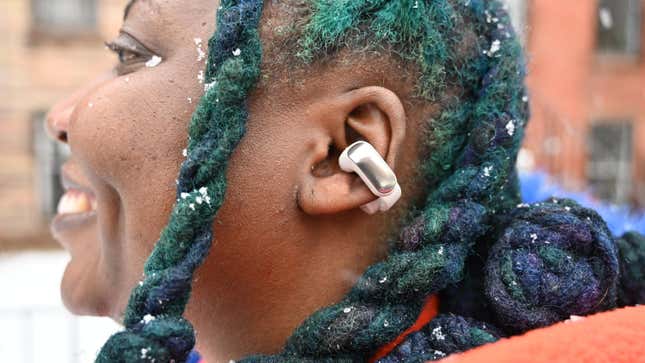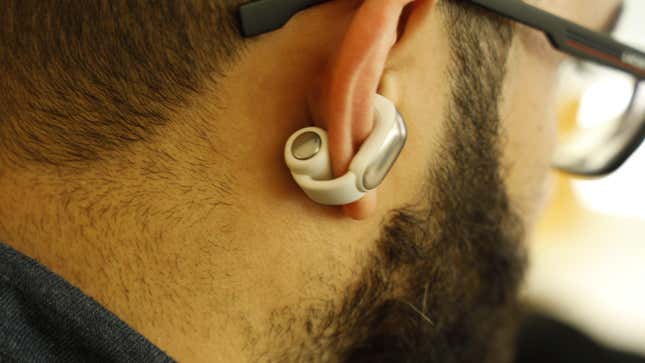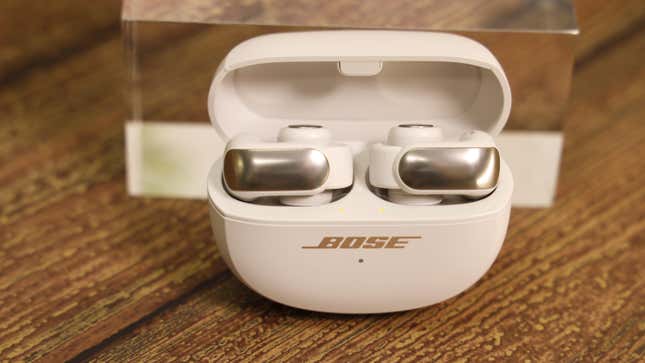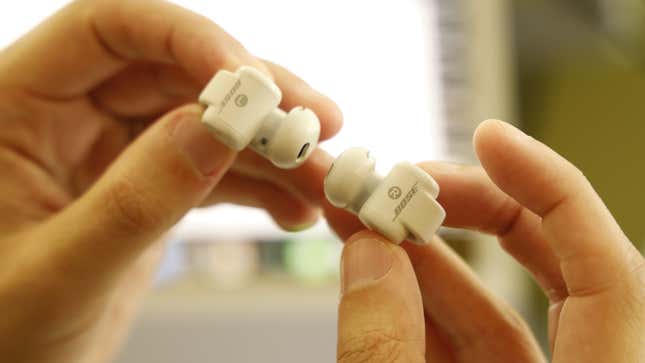Bose Ultra Open Earbuds
Bose goes off the beaten path with the Ultra Open Earbuds, pushing an innovative, futuristic design that’s comfortable with a splash of durability, a full, airy soundscape with great battery life, and a price tag that’s too expensive to lack ANC.
$300 @ Bose
Pros
Comfortable
Innovative design
Great battery life
Excellent Sound With Minimal Bleed
World-renowned audio maker Bose is known for its quality audio and industry-standard active noise cancelation technology. But instead of coasting on its many accolades, the company is jumping onto the bleeding edge of audio with the new Bose Ultra Open Earbuds. The earbuds sport a daring, innovative design, offering all-day comfort and nearly eight hours of battery life with clear, balanced, and 3D audio.
But there’s a wrinkle to the traditional Bose formula: instead of employing the company’s powerful ANC, the Ultra Open Earbuds are just that –– open. Designed to provide a more spacious soundscape while providing listeners with continuous environmental awareness, the earbuds point the speakers toward your ear canal without making direct contact. It’s a trippy effect as you can hear whatever you’re listening to loud and clear along with the rest of the outside world.

While I’m not personally a fan of open-ear audio in public, the Bose Ultra Open Earbuds are very appealing. And while the design might be polarizing to some, the price has me up in arms. At $299, the earbuds match or cost more than some of the flagship earbuds on the market without the benefit of ANC. But for those who enjoy exercising outdoors, like hearing their surroundings while listening to music, or prefer an airier soundstage, the Bose Ultra Open Earbuds are the earbuds du jour.
Bose Ultra Open Earbuds Design
The future of earbuds is now
The Bose Ultra Open Earbuds give off a Cyberpunk 2077/Ghost in the Machine vibe that I’m totally digging. Its soft-touch beige housing (Bose calls it White Smoke), offset with gray brushed metal accents, makes me feel like I’m wearing the jewelry of the future. They’re also available in Black, but they’re more subtle, and if you know me, I don’t do subtlety in the least.
There’s no getting around the Open Earbuds’ flashy, futuristic aesthetic, but there’s plenty of practicality packed into the nouveaux earbuds’ design. Instead of cramming the earbuds into the recesses of your ear canal, the Opens wrap gently yet firmly around your ears’ helix via a flexible arm coated in silicon, floating just above the concha, directing the speaker towards your ear canal. Meanwhile, the cylindrical battery barrel rests along the back of the ear. The arm can be adjusted along the helix for a better fit; you just have to get over the urge to place the earbuds into your ear rather than on.
The Ultra Open has an IPX4 rating, making them water and sweat-resistant, which is all you need for an earbud like this.
And while the Opens don’t look like most earbuds on the market, its case looks similar to others on the market with its oblong shape and hard plastic construction. The matte White Smoke case has Bose stamped across the front in gold paint, with a large pairing button in the rear. The USB-C port sits at the bottom of the case. The earbuds ship with a USB-A to USB-C cable for when it’s time to charge. Open the case and see a glossy plastic seat with gold connector pins.

Bose Ultra Open Earbuds Controls and Fit
You can wear the earbuds all day; they’re just that comfortable.
I felt totally at ease wearing the Ultra Open during the initial demo. But, I have to admit my anxiety level started rising when I started wearing them. I couldn’t shake the feeling that I was a quick stutter step or over-enthusiastic exercise routine away from sending one or both buds flying. After a couple of hours, I found myself running down a flight of stairs, trying to catch the J train, and later spending 30 minutes on the elliptical and 30 minutes lifting weights. The Bose Ultra Open earbuds didn’t budge –– even when I was a sweat-covered mess.
I barely felt the Ultra Open for the 40 hours I wore them; they’re just that light. And since they don’t sit inside your ear canal, I didn’t feel any pressure on my ear’s concha or just inside the ear canal –– two places where I usually get earbud fatigue. What I like most about the Ultra Open is the unobtrusiveness. I decided to wear my glasses for a day and appreciated how the arms of my glasses never came in contact with the earbuds. The Bose stayed in place despite being buffeted by my medium-sized braids. The right one didn’t budge when I started scratching like a mad woman to relieve the itch on my concha.
How do you control these things? Look no further than the silvery button at the top of the battery barrel. This proper multifunction button handles play/pause, answer/end calls, skip forwards/backward, Immersive Audio, and even volume. It’s all done through a series of button presses, whether a one-, two- or three-button quick press or a mix of short and long presses. Except for volume, all of the controls were easy to perform; the button depresses with a nice, tactile click—volume, controlled by a quick then a long press, which allowed me to lower the volume. But I couldn’t raise the volume.

Bose Ultra Open Earbuds Sound
The soundtrack of your life. It’s just accentuated with ambient noise.
I live in New York City, where carving out some quiet can sometimes seem impossible. That’s why I prefer closed-ear headphones with powerful active noise cancellations. The Bose QuietComfort Ultra headphones currently sit in my top five noise-canceling headphones picks.
But the Ultra Open definitely has appeal as I could walk down the street and be aware of what’s happening around me instead of my usual self-imposed obliviousness. I even listened in on a bad date recap while riding the subway. Nosiness aside, the openness came in handy when talking to my boyfriend. I didn’t have to remove or turn down the music to engage in conversation. His deep, gravelly voice occupied the same space as Victoria Monet’s “On My Mama,” each taking its time in the foreground, depending on where I focused.
Speaking of audio quality, I’m happy that Bose didn’t hold back. The titular drums were front and center as I jammed to “Bongos,” the upbeat collab between Cardi B. and Megan Thee Stallion. The 808s were a bit light, but the salacious vocals from both rappers were strong. When I switched to Faith Evans’ “You Used to Love Me,” I could hear the twang from the bass guitar and the cymbals’ gentle tic. The soundstage still had plenty of space for the harp, guitar, violin, and synthesized keyboard without overshadowing Evan’s lilting soprano or the background singers.
Bose’s secret audio sauce comes from its proprietary OpenAudio technology, which combines a transducer and a “tightly controlled acoustics structure” that works to prevent sound leaks from the outside world. That’s true to a certain extent. At 50% volume, the Ultra Open blocked out most of the NYC subway din. However, some sounds, like the train pulling into the station, street construction, or a loud conversation, can filter their way into the soundscape in the most distracting ways.
In case you’re worried about audio bleed from the Open, I can put those fears to rest. It took cranking the earbuds to 100% for me to hear any bleeding in a completely silent room. Although I could listen to every word of Janelle Monáe’s “Phenomenal,” it was still very faint. It would be difficult to pick up the bleeding in a noisier setting.
These days, it’s not a premium pair of buds without the inclusion of some spatial audio. In the case of the Bose, you have Immersion Audio mode, a combination of the company’s digital signal processing software and onboard IMU (Inertial Measurement Unit). You can toggle between Still, Motion, and Off from either the Bose Music app or a long press on one of the buds. When engaged, Immersion Audio creates a wider soundstage that gives the impression of a three-dimensional listening experience. It is still pretty straightforward as it works best when the listener isn’t moving, while Motion is best when moving around. Both ensure you’re always in the sweet spot of whatever you listen to.

Bose Ultra Open Earbuds Battery and Mic
The battery life lives up to the hype.
I called my mom and held a quick conversation. I heard everything, including the bass and vocals on Lil Wayne’s “A Milli.” My mother’s voice was loud and clear as we discussed upcoming dinner plans. She said she could hear me clearly and the explosions from the movie I had playing in the background. Whoops!
Bose estimates that the Open can last 7.5 hours with Immersion Audio disabled and 4.5 with it on. I managed to squeeze 7.25 hours out of the buds sans Immersion Audio, using the earbuds to take several calls, a few Zoom meetings, watch Griselda and several episodes of The Brothers Sun, and listen to my playlist on Spotify over one day. With Immersion Audio enabled, the earbuds lasted 4 hours and 23 minutes before I got the low battery alert.
When it’s time to charge the earbuds, the charging case can deliver another 19.5 hours or 12 hours, depending on whether Immersive Audio is on or off.
Should You Buy the Bose Ultra Open Earbuds
If you’re looking for a great pair of earbuds that serve clean, powerful audio and don’t need active noise canceling, the Bose Ultra Open Earbuds are for you. The buds offer slight durability with nearly 30 hours of battery life (with the charging case) and are incredibly comfortable even after hours of wear. And in terms of design, nothing on the market looks anything like the Ultra Open.
But man, I wish Bose could have found a way to shave $50 – $100 off the price, especially since a $299 price tag puts the Ultra Open in direct competition with a number of flagships that offer many of the same features (i.e., great audio, solid battery life, some durability, and 3D audio) with the added benefit of ANC – including Bose’s own QuietComfort Ultra Earbuds. However, for those who prize maintaining situational awareness at all times, $299 is a small price to pay.

